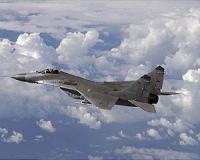| . |  |
. |
Washington (UPI) Jun 10, 2010 There's general agreement that the United States' security agencies need to be more unified to keep Americans safe, a fact on display at a congressional subcommittee meeting this week. What the experts and members of Congress cannot agree on is how to bring about that kind of reform. "The national security system must be modernized to meet the challenges of the 21st century," said James Locher III, head of the Project on National Security Reform, a government-funded think tank. "The task will be monumental but there is no alternative." Unlike military threats during the Cold War, new challenges the United States might face include an influenza outbreak, natural disasters or unstable states around the world that could become home to extremists. The military, diplomats, aid workers, law enforcement and many other agencies have to work in tandem to address these issues. But the current system, based on the 1947 National Security Act, separates the departments and leaves little formal room for shared planning and action. Interagency collaboration, as it's called, is underdeveloped. The difficulties are apparent in Iraq and Afghanistan, where the United States has struggled to effectively combine civilian and military means. "While national security activities ... require collaboration among multiple agencies, the mechanisms used for such activities may not provide the means needed to meet modern national security challenges," the Government Accountability Office, a non-partisan watchdog, wrote in a 2009 report. Practical problems, however, prevent a closer integration of government agencies and effective information sharing. For example, the Pentagon collects information such as fingerprints or iris scans "in a way that make it incompatible with Homeland Security and FBI databases," John Pendleton of the GAO pointed out at the subcommittee hearing Wednesday. And it's not just databases that don't match. The State Department and Pentagon "divide the world up differently," Pendleton said. Their regional bureaus hinder policy coordination. The Pentagon dwarfs other agencies in both budget and manpower. Military people like to convey that all the foreign service officers aren't enough to staff an airplane carrier -- of which the U.S. Navy has 10. The budgets of the State Department and the U.S. Agency for International Development combined make up about one-tenth of the Pentagon's, Pendleton pointed out. Because of this lopsidedness, American University Prof. Gordon Adams recommended building up the civilian agencies. "The focus of reform needs to be on the civilian agencies and capabilities first," said Adams, who is also a fellow at the non-partisan Stimson Center. The civilian agencies lack strategic vision, resources and trained personnel, Adams said. And they need those to be more helpful. U.S. Secretary of State Hillary Clinton's proposed shared national security budget would better integrate disparate departments -- and it would also help civilian agencies get a bigger share of the fiscal pie. While funding for the military is usually granted even in times of fiscal strain, the State Department and development agencies can have trouble getting lawmaker's ears for their funding requests. This year, they got help from an unexpected side: the Pentagon. Both Secretary of Defense Robert Gates and Navy Adm. Michael Mullen, chairman of the Joint Chiefs of Staff, wrote to lawmakers to urging them to fully fund the State Department's budget. "Diplomatic efforts should always lead and shape our international relationships, and I believe that our foreign policy is still too dominated by our military," Mullen wrote to House Speaker Nancy Pelosi, D-Calif., and House Minority Leader John Boehner, R-Ohio. He added that "diplomatic and developmental capabilities of the United States reduce the need for military action." Communicating this reality to taxpayers can be difficult, as Adams explained Wednesday. "Getting the American people to understand that this long-term investment is in our national security interests is the challenge that every secretary of state has had every year in justifying their budget request," Adams said.
Share This Article With Planet Earth
Related Links The Military Industrial Complex at SpaceWar.com Learn about the Superpowers of the 21st Century at SpaceWar.com
 Russia supplying Syria with combat jets
Russia supplying Syria with combat jetsMoscow (UPI) Jun 9, 2010 Russia has agreed to supply Syria with combat aircraft and other defense equipment, saying a previous sale was legitimate. Citing remarks by Mikahil Dmitriyev, the head of Russia's federal service of military and technical cooperation, the state-run ITAR Tass news agency said Moscow's sale concerned MiG-29 fighter jets, Pantasir short-range defense systems and armored vehicles. D ... read more |
|
| The content herein, unless otherwise known to be public domain, are Copyright 1995-2010 - SpaceDaily. AFP and UPI Wire Stories are copyright Agence France-Presse and United Press International. ESA Portal Reports are copyright European Space Agency. All NASA sourced material is public domain. Additional copyrights may apply in whole or part to other bona fide parties. Advertising does not imply endorsement,agreement or approval of any opinions, statements or information provided by SpaceDaily on any Web page published or hosted by SpaceDaily. Privacy Statement |